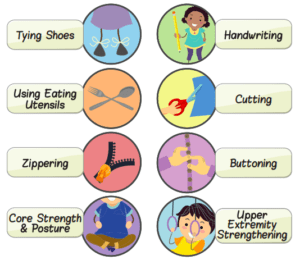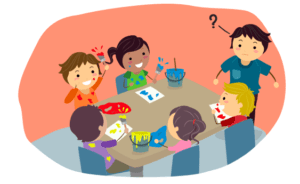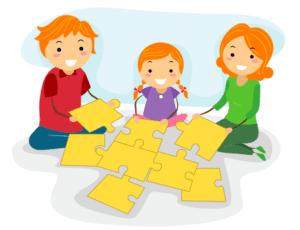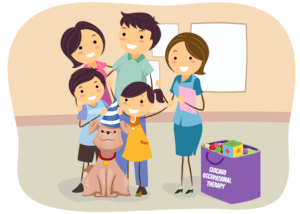Occupational therapy is a unique discipline that is centered around the belief that engagement in everyday activities (i.e., occupations) is essential to health and wellbeing, and a vital source of joy and happiness. Occupational therapists work with their clients to identify occupations that are difficult to complete due to injury, illness, or varied ability and collaboratively find unique ways to support the individual’s ability to engage in the daily activities he or she wants and needs to do.
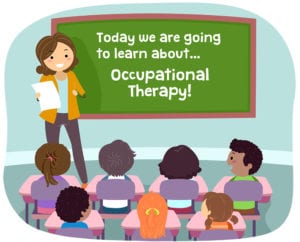
What Is Pediatric Occupational Therapy?
Pediatric occupational therapy helps children to develop the skills necessary to participate in a variety of occupations:
- Daily Activities & Self Care
- Fine-Motor Skills
- Handwriting
- Gross-Motor Skills
- Bilateral Coordination
- Sensory Processing
- Self-Regulation
- Visual-Motor Integration
- Visual Perception
- Executive Functioning
What Are Signs Your Child May Need Occupational Therapy?
- Difficulty with daily activities & self-care:
– Dressing, buttoning, zipping, and shoe tying
– Bathing and grooming
– Mealtime and self-feeding
– Toileting
- Decreased fine-motor skills or difficulty with:
– Manipulating small objects
– Using scissors
– Hand strength
- Difficulty with handwriting:
– Letter formation, sizing, and spacing
– Age-appropriate pencil grasp
– Pressing too hard or too light on the paper
- Decreased gross-motor skills or difficulty with:
– Maintaining a seated position in a chair or on the floor
– Running or walking to participate in desired activities
– Poor coordination and/or balance
- Difficulty with bilateral coordination:
– Using one hand to stabilize paper, while the other cuts or writes
– Shoe tying and buttoning
– Stringing beads
- Difficulty with sensory processing:
– Hypersensitivity to touch or sound
– Frequently touching things or other people
– Purposely bumping or crashing into things, people or walls
- Difficulty with self-regulation:
– Frequent emotional breakdowns with transitions
– Inattention or emotional breakdown with non-preferred activities
– Turn-taking and social interactions
- Difficulty with visual-motor integration
– Throwing or kicking a ball
– Stacking items
– Fitting puzzle pieces together
- Decreased visual perceptual skills
– Recognizing and differentiating letters, numbers, and shapes
– Recalling visual images that have been seen
– Determining the location of objects in relation to oneself
- Difficulty with executive functioning
– Focusing on tasks and problem solving
– Transitioning between environments or activities
– Impulsivity
– Remember and following multi-step tasks
What Is The Occupational Therapy Process?
Step 1: Evaluation – An occupational therapist will complete a personalized evaluation to assess if your child is a good candidate for occupational therapy services and what areas therapy should focus on.
Step 2: Intervention/Treatment – The occupational therapist will create customized goals according to your child’s needs. Then he or she will develop interventions specifically for your child to improve his or her ability to perform daily activities and reach his or her goals.
Step 3: Re-evaluation – Approximately every 12 months, the occupational therapist will assess the progress your child is making toward his or her goals and make recommendations for future goal attainment and/or discharge.
Step 4: Discharge – Based on your child’s progress throughout therapy your therapist may make recommendations for discharge. Discharge recommendations are typically based on achieving age-appropriate milestones in target areas that were identified during the evaluation.
How Do We Conduct Our Therapy?
We believe in delivering quality occupational therapy and making the child feel comfortable. Our therapy team works with children in a variety of settings: at home, at school, and in our state-of-the-art clinic! We also work closely with other professionals in a variety of disciplines, so your child gets exactly what he or she needs. This is our mission as an organization and the primary reason we exist.
Contact Information:
Contact Chicago Occupational Therapy or call (773) 980-0300 to learn more about our services and how we can help your child flourish and grow.

